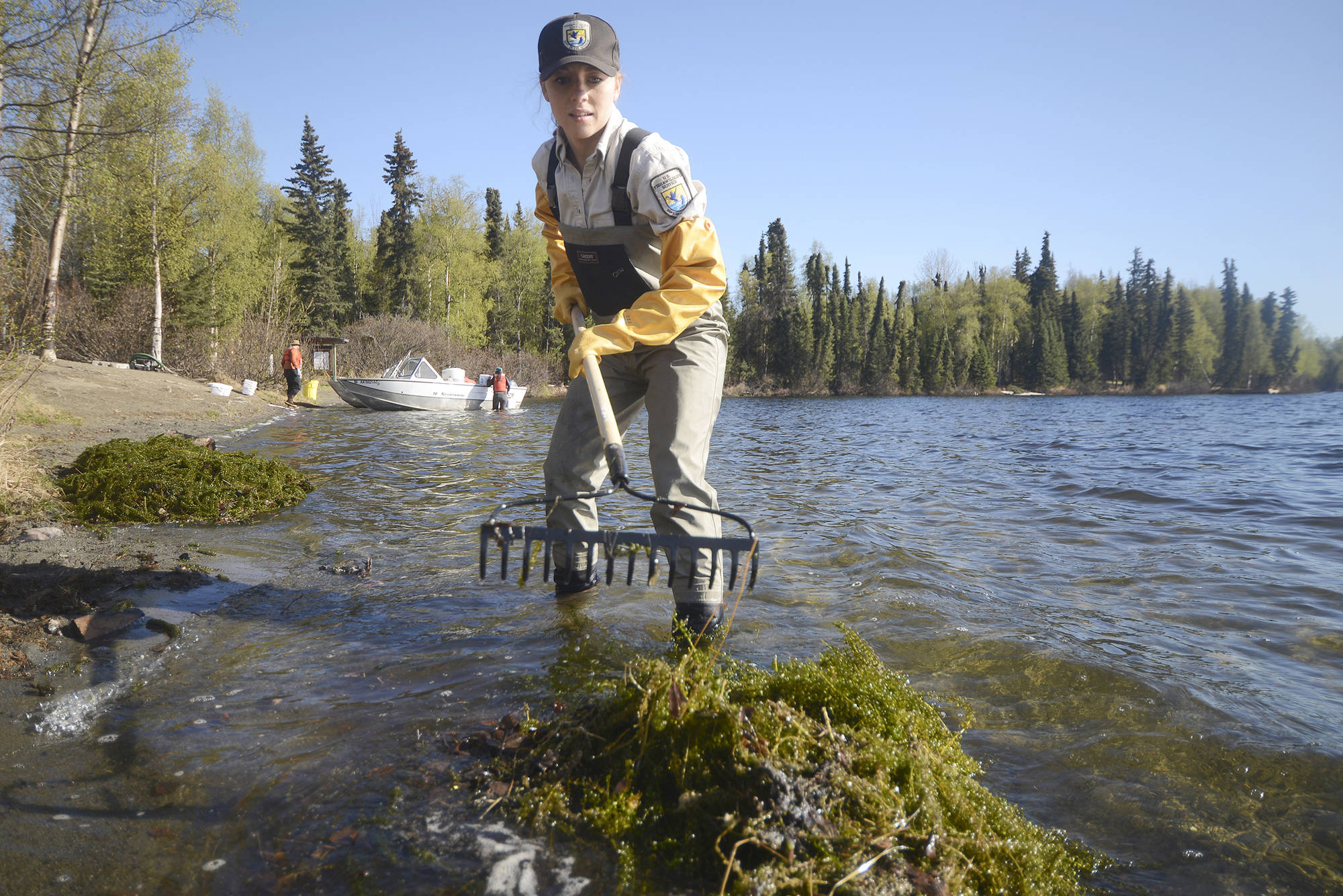Editor’s note: This story has been republished to the web. It was originally published on July 27, 2018.
By JOHN MORTON
Kenai National Wildlife Refuge
Early last week, we applied another round of herbicide to ensure that Elodea, a highly injurious invasive plant, was eradicated from Sports Lake. Elodea was discovered here 19 months ago when a state fisheries biologist augered holes through the ice in preparation for a youth fishing derby. Partners in the Kenai Peninsula Cooperative Weed Management Area responded quickly, applying herbicide in May and July of 2017. By the end of that summer, Elodea had declined from 32 to 4 percent of sampled sites. After maintaining the herbicide at lethal levels (~5 ppb) all winter, Elodea has yet to be detected in Sports Lake this summer.
What’s remarkable about this success story is that when the ice went out on May 1 last year, Elodea was so abundant that long strands had wracked along the shoreline, making it difficult to wade through! Several lakeside homeowners commented they had not seen anything like this before. Yet, when Sports Lake was surveyed in 2013, Elodea was not found. So sometime in the intervening three years, Elodea was introduced before the population exploded in 2017.
This happened in another Alaskan lake. In 2014, Elodea was found in Alexander Lake in the Mat-Su. A few scattered plants over 10 acres were growing in front of a lakeside cabin owned by a floatplane pilot who commuted between there and then-Elodea-infested Sand Lake in Anchorage. By the time biologists returned to apply herbicide in 2016, Elodea had exploded over 500 acres of Alexander Lake.
Contrast these two explosive stories (pun intended) with how Elodea has infested other lakes in Alaska. Elodea was first discovered in Alaska in 1982 when it was incidentally collected during an aquatic plant survey of Eyak Lake in Cordova. It languished, unappreciated, as a pressed herbarium specimen at the University of Alaska Fairbanks for almost three decades.
In 2009, a second specimen was added to the herbarium when botanist Al Batten collected Elodea in Chena Slough, which flows through Fairbanks. The following year, a floating fragment was found in Chena River, downstream of its confluence with Chena Slough, by two Forest Service ecologists who recognized that this was the first submersed freshwater invasive plant to establish in Alaska.
With this new awareness, detections around the state came quickly. Established Elodea infestations were found in Anchorage lakes in 2011, six remote waterbodies on the Copper River delta, and Stormy and Daniels Lakes near Nikiski in 2012.
In Fairbanks, Anchorage and initially on the Kenai Peninsula, Elodea was probably introduced to local waters through aquarium dumping. Elodea is commonly used in the commercial aquarium trade and, in fact, was sold by Petco in Soldotna as recently as 2013. A likely scenario is that an aquarium owner, tired of their pet fish but not willing to flush them down the toilet, frees them (and Elodea) into the nearest waterbody.
Here on the Kenai Peninsula, ground zero was Beck Lake based on the abundance and distribution of Elodea before herbicide treatments. A tropical fish shop on Halbouty Road, near Beck Lake, reportedly went out of business in the mid-1990s and it seems probable that this is when Elodea was introduced.
We have good evidence that initial introductions around Alaska were independent events. Genetic analysis indicates that Elodea nuttallii occurs in Fairbanks, E. canadensis in Anchorage and Cordova, and their hybrid in the Nikiski lakes. The hybrid is common in the commercial aquarium trade, more support that these populations arose from independent aquarium dumps.
When a plant is first introduced to a novel system, it may die or survive, but it typically has to adapt to local conditions to thrive. Both Elodea species are native to the mid-continent, and so are adapted naturally to warmer waters, and Elodea raised for the aquarium trade are growing in an even warmer and more thermally-stable environment. So if Elodea survives that initial dump into Alaskan waters, it’ll take several generations (aka years) to adapt to the colder waters.
But adapt it did. Our best evidence is a case of “reverse engineering”. When we first determined that Elodea in Stormy Lake was a hybrid, I sent live specimens to Fort Collins, Colorado, where SePRO Corporation, the manufacturer of the herbicide we use, has a laboratory. Here, Andrew Skibo planned on conducting experiments to assess the herbicide’s efficacy on the hybrid.
However, when Dr. Skibo tried propagating the Elodea we sent him, it only limped along in his room-temperature tanks. He figured that the sample we sent him had been stressed during shipping, so I sent him another live sample. When he still couldn’t grow that, he realized something wasn’t right. Skibo came up with the bright idea of dropping the water temperature in the tanks, and that’s when the Elodea exploded. Our Elodea from the Kenai Peninsula had become cold-adapted—but it took perhaps two decades of struggling in the waters of Beck Lake before it too became explosive in its growth.
And that’s why I think Elodea has exploded in Sports and Alexander Lakes. Instead of introducing warm-adapted plants from aquarium dumps, we are now accidentally moving cold-adapted plants from established populations around the state by floatplanes and motorboats. Elodea in Alexander Lake was likely introduced from Sand Lake by floatplane, and the Elodea in Sports Lake was presumably brought in by floatplane or via the public boat launch.
The bad news is Elodea is more viral than ever. The good news is that the Alaska Department of Natural Resources maintains a quarantine on importing Elodea into the state. And, as we’ve demonstrated in Beck, Daniels, Stormy and now Sports Lake, there is a viable means to kill it.
Dr. John Morton is the supervisory biologist at Kenai National Wildlife Refuge. Find more information about Elodea at http://peninsulaclarion.com/outdoors/2017-07-13/refuge-notebook-your-photo-can-save-salmon-kenai-peninsula. Find more Refuge Notebook articles (1999-present) at https://www.fws.gov/refuge/Kenai/community/refuge_notebook.html.

